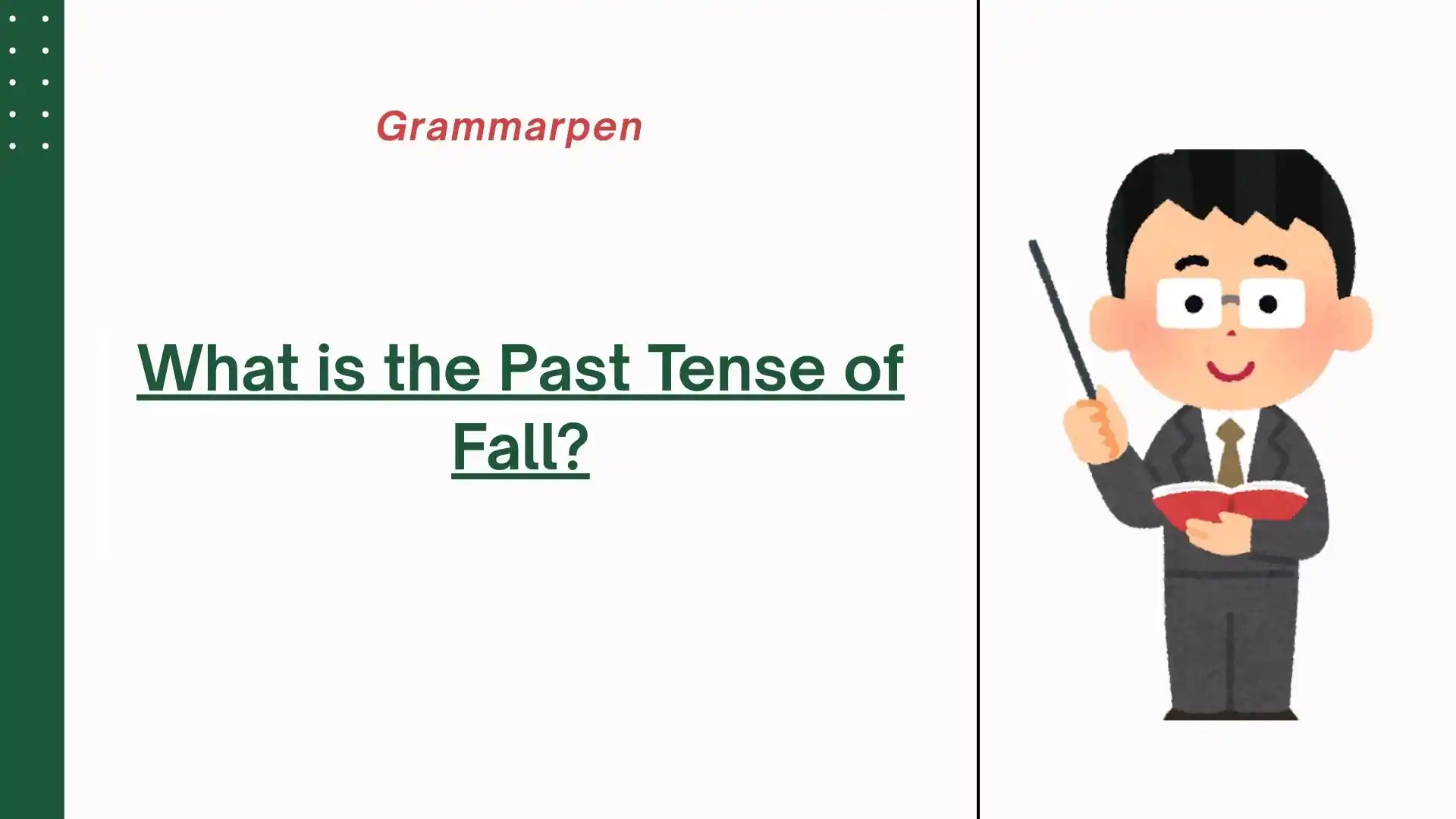What is the Past Tense of Fall?

The verb “fall” is an irregular verb, which means it does not follow the regular pattern of simply adding “-ed” to form its past tense. The correct past tense of “fall” is “fell.”
This form is used to describe an action of dropping, descending, or losing balance that happened in the past. Because it is irregular, learners cannot predict the past tense by looking at the base form, so it must be memorized and understood through repeated use in real contexts.
Research in language acquisition from universities such as Cambridge and Oxford has shown that irregular verbs tend to be learned through frequent exposure rather than strict grammatical rules, making examples and usage practice essential.
READ ALSO: Past Tense of Stink: Definition, Usage, and Examples for Clear Understanding
How is Fell Used in Sentences?
The past tense “fell” is used when the action of falling was completed at some point in the past. It can refer to physical movement, emotional decline, changes in position, or even metaphorical situations. For instance:
-
Physical action: “The child fell from the swing while playing.”
-
Nature or environment: “The leaves fell from the trees during autumn.”
-
Metaphorical use: “She fell from grace after the scandal.”
-
Emotional or situational change: “He fell into depression after losing his job.”
In each of these examples, the action is complete and occurred before the time of speaking. The choice of “fell” over “fall” marks it as an event that is no longer ongoing.
Why is Fall Considered Irregular?
In English grammar, regular verbs form their past tense by adding “-ed” to the base form, as in “walk” becoming “walked.”
“Fall” does not follow this pattern because it changes its vowel from “a” to “e” and drops the final consonant sound shift that might be expected.
This pattern, known in historical linguistics as a strong verb change, is a remnant of older stages of English that preserved vowel changes to mark tense.
Linguistic research from the University of Edinburgh highlights that irregular verbs like “fall” have survived due to their high frequency in everyday speech.
How Does Fell Differ from Fallen?
While “fell” is the past tense, “fallen” is the past participle. The past participle is used in perfect tenses and passive voice constructions. For example:
-
Past tense: “I fell off the ladder yesterday.”
-
Present perfect: “I have fallen off the ladder before.”
-
Past perfect: “She had fallen asleep before the movie ended.”
In short, “fell” stands alone for past actions, while “fallen” works alongside helping verbs such as “have,” “has,” or “had.”
READ ALSO: What is the Past Tense of Swim?
Common Mistakes with the Past Tense of Fall
Language learners sometimes confuse “fell” and “fallen” or mistakenly add “-ed” to form “falled,” which is incorrect. Others mix up the tense entirely and say “fall” when “fell” is required. For example:
Incorrect: “Yesterday, I fall in the pool.”
Correct: “Yesterday, I fell in the pool.”
Avoiding these mistakes requires understanding that “fell” is the only correct simple past form, and “fallen” is reserved for perfect and passive structures.
Practical Examples for Clarity
To reinforce understanding, here are varied contexts where “fell” is used correctly:
-
“The snow fell heavily last night, covering the streets.”
-
“He fell out of his chair when he heard the surprising news.”
-
“Our team fell behind in the final minutes of the game.”
-
“I fell asleep while reading a book.”
These examples show “fell” in physical, emotional, competitive, and situational uses, demonstrating its flexibility in English.
Visual Guide to Fall, Fell, and Fallen
| Verb Form | Function in Grammar | Example Sentence |
|---|---|---|
| Fall | Base form | I will not fall for that trick again. |
| Fell | Past tense | She fell down the stairs last week. |
| Fallen | Past participle | The tower has fallen after the earthquake. |
This table helps visualize the relationship between the base form, past tense, and past participle.
READ ALSO: Is It “In Between,” “Inbetween,” or “Between”?
Historical Evolution of the Word Fall
The verb “fall” comes from the Old English word “feallan,” which had a similar meaning. Over time, the past tense “feoll” transformed into the modern “fell.”
This shift reflects broader changes in the English language during the Middle English period, where vowel patterns and endings changed due to influences from Norse, French, and other languages.
Why Understanding Fell is Important for Communication
Using the wrong tense can confuse listeners or readers about when an event happened. In professional settings, such as writing reports or giving testimonies, correct tense use ensures accuracy. In storytelling, tense choices create a clear timeline and maintain the audience’s understanding.
READ ALSO: What Is the Plural of Diagnosis?
Frequently Asked Questions
1. Is “fell” only used for physical falling?
No. “Fell” can describe emotional, social, or metaphorical declines, such as “fell in love” or “fell from power.”
2. Can I say “had fell” instead of “had fallen”?
No. In perfect tenses, the correct form is “had fallen,” not “had fell.”
3. Why do some people say “fall” instead of “fell” in casual speech?
In informal or dialectal speech, some speakers may incorrectly use the base form in place of the past tense, but this is considered nonstandard in formal English.
4. How can I remember the correct form?
Practice using “fell” in past-tense contexts and “fallen” with helping verbs. Reading and listening to native English materials can help reinforce these patterns.
5. Are there other verbs like fall?
Yes. Verbs like “begin” (began, begun) and “see” (saw, seen) also have different forms for past tense and past participle, following irregular patterns.
